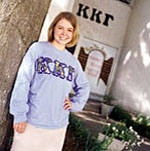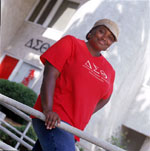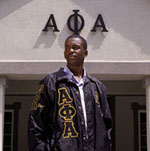|

|
|
|
|
 |
|
It’s
dinnertime at the Sigma Chi house, and the noise level is rising
as the brothers line up, cafeteria-style, to fill their Styrofoam
plates. The dining room is rather spare, with long folding tables
and metal chairs, and the cutlery is plastic; but there are
steaming pans of ham, barbecue, sweet potatoes, and mixed vegetables.
Just like Mom used to make.
“I’d
say dinner is, like, a pretty important time of day for us,”
says senior Jeffrey Borenstein, between bites, surveying the
rapidly filling room. Behind him, there’s a sudden crash
that makes Borenstein jump; one of his fraternity brothers has,
inexplicably, attempted to leap over a chair, and didn’t
quite clear it.
Dinner
with the Sigma Chis is very casual, even a little chaotic. It’s
a warm March day, and most of them are wearing shorts, T-shirts,
and flip-flops. Several have wet hair, fresh from the shower
or gym. They jostle, shove, and talk over one another until
they’re almost yelling; inside jokes and offhand insults
fly thick. But it’s clear this is a time they look forward
to, a time to congregate and talk over the events of the day,
and to make plans for the night.
About
half of the sixty Sigma Chis, away from home for the first time
as college students, live here in the house. Across from fraternity
president David Politis, Jacques Edeline, a sophomore with an
impish grin and wild, bushy hair that sticks up all over his
head, takes a seat. He has a plate stacked with four pieces
of white bread and good-sized mounds of peanut butter and jelly,
presumably to fortify him for tonight’s chapter meeting.
Is that his dinner?
“No,
I had some ham and vegetables already,” he says. “This
is just . . . my after-dinner snack.”
On
a campus as sprawling, diverse, academically challenging, and
potentially impersonal as Emory, joining a fraternity or sorority
can provide students with a sense of community that helps keep
them grounded. Some twenty-five percent of Emory’s six-thousand-plus
undergraduates opt to go Greek, a high number for a private
school, says Andrea Gaspardino (below), director of sorority
and fraternity life. State schools average about ten percent.
 “I
think students really want to feel a sense of belonging, to
feel they are part of something bigger,” Gaspardino says.
“Being in a fraternity or sorority helps them to identify
with Emory. They have a bigger place in their hearts for their
organization, and for Emory, because of that experience.” “I
think students really want to feel a sense of belonging, to
feel they are part of something bigger,” Gaspardino says.
“Being in a fraternity or sorority helps them to identify
with Emory. They have a bigger place in their hearts for their
organization, and for Emory, because of that experience.”
“The
overall goal of Campus Life is to promote a sense of community
among our student body, and I think fraternities and sororities
create a sense of several communities within a larger one,”
says John L. Ford, senior vice president and dean of Campus
Life. “I think at large universities like this one, that
bond within a fraternity or sorority often lasts through the
undergraduate experience and beyond into one’s alumni years.”
Many
freshmen choose to go through the recruitment process (they
avoid the usual term “rush,” because it is thought
to connote hazing) because of the social networking opportunities
it offers. Brad Friedman (above), a junior from Boca Raton,
Florida, who’s pre-med and also majoring in political science,
said he participated in fraternity recruitment because one of
the leaders in his freshman advisory group was president of
the Inter-Fraternity Council at the time, a position Friedman
holds now.
“He
invited me over to his fraternity house and I met a lot of kids
that way,” Friedman says. “I thought it was cool.
Everyone ate together and seemed to have a great time.”
 “Fraternities
add so much to my college experience that I actually cannot
even begin to explain it all,” says Travis Blalock (right),
a senior from Dallas, Georgia, majoring in religion and ethics
and a member of Kappa Alpha. “I live with my brothers,
eat with them, party with them, study with them, and work with
them. My love of Emory has been shaped by the potential growth
and success of the fraternity community, despite the negative
stereotypes fraternities take on.” “Fraternities
add so much to my college experience that I actually cannot
even begin to explain it all,” says Travis Blalock (right),
a senior from Dallas, Georgia, majoring in religion and ethics
and a member of Kappa Alpha. “I live with my brothers,
eat with them, party with them, study with them, and work with
them. My love of Emory has been shaped by the potential growth
and success of the fraternity community, despite the negative
stereotypes fraternities take on.”
For
Emory women, going Greek is a different experience from that
of the men, mainly because the sorority lodges don’t accommodate
more than a couple of residents, and chapter members don’t
take regular meals there. Without more residential housing,
it’s difficult for sororities to provide the same intense
bonding opportunities that come from living under the same roof.
But the lodges offer common spaces for studying, working, meeting,
and just hanging out together.
Despite
the differences, Emory’s nine sororities are thriving,
with the largest chapter numbering 190 members. Of 1,301 freshmen,
452 women went through sorority recruitment this year (as compared
to 312 men), and 401 were placed in chapters (188 men joined
fraternities).
 Elise
Hammonds (left), a junior and president of the Inter-Sorority
Council, says being in a sorority “makes Emory smaller.
It’s 160 faces on campus you can know and say hello to.
They’re your sisters and they help you out if you need
it.” Elise
Hammonds (left), a junior and president of the Inter-Sorority
Council, says being in a sorority “makes Emory smaller.
It’s 160 faces on campus you can know and say hello to.
They’re your sisters and they help you out if you need
it.”
“The
Greek system is vital to this campus,” agrees Christopher
Garcia, a senior Sigma Chi from San Diego majoring in business.
“I guess it’s because of the social stuff–the
mixers, date parties, socials. Greeks are always the fun people.”
Of
course, it’s precisely because of the high level of “fun”
associated with Greek life–commonly known to engender alcohol
use and abuse, loud parties, hazing or abuse of new initiates,
destructiveness, and a general propensity to debauchery a la
the 1978 movie Animal House–that the fraternity and sorority
system has become increasingly controversial at American universities,
particularly in the last decade. More often than not, fraternities,
not sororities, make headlines and get the credit for the Greeks’
bad reputation, perhaps because they tend to have bigger houses,
longer histories, more elaborate traditions, and tougher expectations
for their new initiates.
Ongoing
troubles have led some colleges, including Bowdoin College,
Colby College, and Alfred University, to abolish Greeks altogether;
others have severely curtailed their activities. In 2001, Hamilton
College President Eugene Tobin published an opinion in the Chronicle
of Higher Education describing how, after years of struggling
to manage unruly and socially dominant fraternities, Hamilton
finally opted to close their houses, but allow the fraternities
to remain as recognized student organizations. Although he ultimately
declared the move a success, it was met with vehement resistance
from both students and alumni.
Ten
years ago, Emory’s Fraternity Row, too, was on thin ice.
Its chapters were limping along, hobbled by lagging membership
and houses that were in serious disrepair. Worse, the fraternities
were frequently called on the carpet for violating national
policies on alcohol use, recruitment, and new member initiation.
Six of the fourteen chapters were temporarily banned from their
houses in the last decade.
In
the late 1980s, for instance, the Alpha Tau Omega fraternity
was struggling with consistently poor grades. Its members were
also known for high alcohol use, and were repeatedly cited for
hazing.
Paul
McLarty ’65C, an alumnus of the fraternity, says he went
back to visit the house during his twenty-fifth reunion in 1988
and was disturbed by what he found.
“We
were dead last in terms of GPA of all the Greek organizations,”
McLarty says. “The house was just in terrible shape. The
chapter did not have a chapter adviser. They were having hazing
problems.”
The
scene was a far cry from what McLarty remembered of his own
experience as an ATO. “In my house and in most houses,
we had a good leadership structure,” he recalls. “We
were electing our best leaders to head the fraternity, and they
were also likely to be on the honor council or in student government.
When I came back all those years later, the fraternities wanted
the leader to be the biggest party guy. I found that a little
upsetting.”
McLarty,
one of many Emory alumni who have continued to support their
Greek chapters, became the chapter adviser and tried to help
the brotherhood get back on the right track. Despite his efforts,
though, in 1994 an ATO pledge wound up in the hospital with
alcohol poisoning and the fraternity’s charter was terminated
for a year. “We basically had to start all over,”
McLarty says. “We went out and recruited a brand-new group
of young men.”
Other
party violations at Emory include a bash in 1993 where a fraternity
destroyed all the fire alarms in their house, getting themselves
kicked off campus. More recently, all frats were put on probation
after a party with a dangerously high seven-hundred-person guest
list.
Rather
than disbanding fraternities or depriving them of their houses,
Emory administrators resolved to pull them closer. Campus Life
leaders developed the Phoenix Plan, which brought the responsibility
for maintenance and oversight of the fraternity houses under
University governance. Previously, chapter members paid their
housing costs to local fraternity house corporation boards made
up of alumni, who were responsible for maintaining the structures,
with the help of student leaders. Now, says Bridget G. Riordan,
assistant vice president for Campus Life, “The alumni don’t
have to worry about fixing the facility all the time, just about
making a strong chapter.” The University also placed full-time,
paid house directors in each house.
Not
surprisingly, Greek students and alumni had mixed reactions
to the Phoenix Plan. Some strongly objected, saying it compromised
their autonomy. But half a dozen years later, most have come
to accept and even welcome it.
“There
are pluses and minuses,” IFC president Friedman says, “but
there are more pluses. It takes a lot of pressure off individual
house leadership.”
Within
a couple of years of the implementation of the Phoenix Plan
in 1997, all the major maintenance issues had been addressed,
and many of the fraternity houses had been fully refurbished.
Now Fraternity Row boasts impressive, well-kept houses, with
rooms similar to those in dorms. (Certain upgrades, like the
gleaming billiard tables, leather chairs, and portrait of General
Robert E. Lee in the KA house, are still helped along by alumni
funds, although Emory oversees the work.) The students’
housing expenses, which they pay to the University, are about
the same as the cost of living in dorms.
Plans
are being formed to improve the sorority lodges, and will likely
include building new, more residential homes for the sororities
and including them in the Phoenix Plan, according to Riordan.
“I
think we can be proud of the beautiful appearance of Fraternity
Row, and much of that is due to the Phoenix Plan,” says
Ford. “We are able to exert a positive influence on some
potentially problematic aspects of Greek life.”
When
ATO was re-chartered in 1995, their house was renovated under
the Phoenix Plan. The chapter also had some new standards in
place–among them a 3.2 GPA requirement, which altered the
potential pool considerably. In the last six years, McLarty
says, there have been only two semesters when ATO did not have
the top GPA on the row, and they have won the Dean’s Cup
twice. “I think the fraternity is doing very well,”
McLarty says.
The
Phoenix Plan, as hoped, revitalized more than just the houses.
Fraternity membership is up as compared to a decade ago, and
at this point all Emory fraternities are in good standing, says
Riordan, with drinking and hazing policies being taken more
seriously.
Indeed,
Fraternity Row at Emory is considered to have a relatively tame
party scene. A recent editorial in the Emory Wheel actually
urged the University to “make Greek life fun again,”
claiming a new party policy passed in 2002 by the IFC is so
strict it’s stifling Greeks’ social life. Visitors
to the fraternity houses are closely monitored during parties,
and Emory police cars cruise the row to discourage underage
drinking. “While student safety obviously should remain
a top priority,” the Wheel wrote, “ . . . the
Office of Fraternity and Sorority Life needs to make sure it
isn’t so concerned with taming the campus social scene
that it kills it altogether.”
Hazing,
too, is reputed to be mild at Emory. All fraternity and sorority
members are required to sign a strict anti-hazing policy. “Our
school is one of the best in making sure there is no hazing,”
Friedman says. “The hazing policy at this point is so strong,
it’s gotten rid of 90 percent of the problems.”
Emory
administrators have been “extremely pleased,” with
the Phoenix Plan and related developments in the Greek system,
says Riordan. “We believe the students are having a valuable
fraternity experience and also living in a place where they
can have pride. We have been able to serve as a model community
to many other universities.”
Academically,
the average GPA of members is higher than the average of the
University as a whole, according to Riordan–not the case
at many universities. Most Emory fraternities and sororities
have a minimum GPA requirement of at least 2.7 for membership.
Many have study groups, and in the fraternity houses there are
designated upperclassmen halls where serious studying is expected.
ISC
president Hammonds chose not to pledge a sorority during her
freshman year because she was concerned about how the commitment
would affect her grades. But since she joined Kappa Kappa Gamma
in her sophomore year, she says, her GPA has actually gone up.
“If anything, the chapter has encouraged me to improve
my grades,” Hammonds says. “If I’m having trouble
with the class, there’s always someone who has taken it.”
During
the fall semester, Greek students also put in 1,900 community
service hours and more than five thousand philanthropy hours
total, raising more than $30,000 for various charities, according
to Gaspardino. Each organization works with particular philanthropies
on projects throughout the school year, many of which are selected
or encouraged by their national leadership. There are also all-campus
events such as Greek Weekend, when sororities and fraternities
join forces to raise money for various charities–and enjoy
some friendly competition.
“A
lot of our sisters are already involved in some kind of volunteer
work when they join,” Hammonds says. “We take this
very seriously.”

All
Greeks participate in philanthropy to some extent, but the historically
African-American fraternities and sororities place special emphasis
on their service work. Senior religion major Alicia Goldsby,
a former ISC president and member of Delta Sigma Theta, one
of Emory’s two black sororities, says public service is
the main focus of their tight-knit, seventeen-member chapter.
They hold programs devoted to educational development, international
awareness, economic development, physical and mental health,
and political awareness. Although they do hold social events,
the Deltas don’t host parties with alcohol or have “date
parties.”
“Membership
in the Greek community has afforded me the opportunity to hold
leadership positions in my chapter and on campus, and to meet
people I would not have met otherwise,” Goldsby says. “If
you are interested in service, then it’s advantageous to
join a black sorority; if not, you can find another chapter
that fits you.”
More
than just a social sisterhood, the black sororities were founded
in part to help African-American students become successful
women on all fronts. Most members stay active and involved long
after college, taking advantage of their national chapter’s
educational, social, and career networking opportunities. The
intense, lasting commitment and serious attitude are a hallmark
of most historically black Greek organizations.
 Stanley
Taylor, a senior political science major and president of Alpha
Phi Alpha, one of three black fraternities, says he became interested
in joining while still in high school, when he spent summers
volunteering in a program for low-income youth in his hometown,
New Orleans. Each summer there would be just a few black men
who volunteered (most of the volunteers were women), and as
it happened, all the college men were members of APhiA. Stanley
Taylor, a senior political science major and president of Alpha
Phi Alpha, one of three black fraternities, says he became interested
in joining while still in high school, when he spent summers
volunteering in a program for low-income youth in his hometown,
New Orleans. Each summer there would be just a few black men
who volunteered (most of the volunteers were women), and as
it happened, all the college men were members of APhiA.
“Something
about the way they carried themselves, and the way they gave
back to that program, definitely piqued my interest,” Taylor
says. “I wanted to find out what it was all about.”
The
Alphas’ largest annual philanthropic event is the Step
for Sickle Cell, one of the most profitable fund-raisers at
Emory. The fraternity has raised more than $65,000 for the Sickle
Cell Foundation of Georgia. The seventeen-member chapter and
its alumni also work with Big Brothers Big Sisters, and volunteer
at Wesley Woods Geriatric Center in partnership with their graduate
chapter.
“I
think when the historically black organizations were started,
it was a time when African Americans were really in a struggle,”
he says. “The purpose was to aid those students who were
really a minority on campus, to help them be successful and
aid others. That focus on community service and uplifting the
community is essential to the founding of APhiA.”
“Historically”
African American means the black Greek organizations are not
exclusively black; the Emory APhiA chapter has included white,
Asian, and Indian members. Likewise, the mainstream fraternities
and sororities include a growing number of minority members.
Two recent ISC presidents have been African American.
“No
one at Emory recruits based on race. It’s just not done,”
Friedman says.
It’s
true that most Emory fraternities and sororities are considered
more racially inclusive than some of the well-established organizations
at large Southern schools, many of which have all-white chapters.
The University of Alabama, for instance, came under fire in
2001 when a promising African-American woman rushed the white
sororities and did not receive a single bid.
But
Emory has had its own, albeit limited, clashes with Southern
racial tensions. In 1998, an Emory student, reportedly not a
member of the fraternity but a guest, was photographed wearing
blackface at a Kappa Alpha Halloween party. The picture appeared
in the 1999 yearbook, angering some black students. The incident
was resolved through the Office of Student Conduct, Riordan
says.
“Anytime
we have an accusation of non-inclusiveness, we look at it very
seriously,” Riordan says. “I would guess we probably
have one of the most diverse Greek systems anywhere.”
Even
so, diversity is an area where some, including Dean Ford, feel
Emory’s Greek community could improve.
“Greek
life is an effective way to create a sense of community, but
the extent to which we can use it to help students from different
backgrounds–racial, ethnic, or religious–to become
a part of the same fraternity or sorority–it would be an
important measure of our success if we could do more of that,”
Ford says.
 Greek
organizations at many colleges are also notoriously unfriendly
to gay students, with few or no openly gay members. Both Friedman
and Chi Phi President Louis Graff (left), who hold leadership
positions among Emory fraternities, say that a student’s
sexual orientation is “not a problem,” and that there
are openly gay men on Fraternity Row. But a recent editorial
in the Emory Wheel suggests that anti-gay bias may still
lurk under the surface. Gay 2003 graduate Mikiel Davids wrote
to praise her own sorority for hosting a Speakers Bureau from
the Office of Lesbian, Gay, Bisexual, and Transgender Life,
but added that all Greeks should take a look at the climate
they create around issues of sexual orientation. Greek
organizations at many colleges are also notoriously unfriendly
to gay students, with few or no openly gay members. Both Friedman
and Chi Phi President Louis Graff (left), who hold leadership
positions among Emory fraternities, say that a student’s
sexual orientation is “not a problem,” and that there
are openly gay men on Fraternity Row. But a recent editorial
in the Emory Wheel suggests that anti-gay bias may still
lurk under the surface. Gay 2003 graduate Mikiel Davids wrote
to praise her own sorority for hosting a Speakers Bureau from
the Office of Lesbian, Gay, Bisexual, and Transgender Life,
but added that all Greeks should take a look at the climate
they create around issues of sexual orientation.
“Running
from the existence of homosexuality in Greek life not only makes
houses that do so hypocritical, but threatens the justification
for their existence,” she wrote. “These houses generally
proclaim to provide an unconditional support system that members
can rely on . . . However, brothers or sisters [cannot] truly
come to know each other deeply if individuals feel they cannot
openly and honestly express themselves.”
 Some
seventy percent of Emory students opt not to be a part of Greek
life. Anton DiSclafani ’03C (right), class speaker at this
year's Commencement, says she decided against pledging a sorority,
although she does not have strong feelings against Greek students
or the system as a whole. Some
seventy percent of Emory students opt not to be a part of Greek
life. Anton DiSclafani ’03C (right), class speaker at this
year's Commencement, says she decided against pledging a sorority,
although she does not have strong feelings against Greek students
or the system as a whole.
DiSclafani
does have close friends who are in sororities, but she says
other friends, particularly those who are more artistically
or intellectually inclined–the “alternative”
crowd–shun Greeks altogether.
“I
guess I just decided pretty early on that a sorority was not
for me,” DiSclafani says. “I didn’t have anything
against them, but I didn’t see myself belonging to such
a group. Nobody in my family has ever belonged to a sorority.
I understand that it’s a social outlet, but I like the
idea of creating my own social avenues instead of depending
on a group. The problem with the Greek system, if there is a
problem, is that it gathers people who are similar anyway.”
Despite
these concerns, Greeks at Emory generally have a reputation
for offering a much more open, welcoming social network than
those at many other schools. Most Greeks say that while some
of their close friends are in their fraternity or sorority,
they also have many friends outside their chapter.
 Adam
Teeter, a junior from Auburn and president of the Student Programming
Council, says he grew up near Auburn University, where the Greek
system is much more socially influential and exclusive than
at Emory. Teeter opted not to pledge a fraternity because he
says he didn’t want to limit himself socially, but by comparison,
he says, the Greek climate at Emory is much more relaxed. Adam
Teeter, a junior from Auburn and president of the Student Programming
Council, says he grew up near Auburn University, where the Greek
system is much more socially influential and exclusive than
at Emory. Teeter opted not to pledge a fraternity because he
says he didn’t want to limit himself socially, but by comparison,
he says, the Greek climate at Emory is much more relaxed.
“At
Auburn, it’s like, you only go to your own frat parties,”
he says. “At Emory I see Greek kids at every party, every
campus function. The houses are a lot more diverse and welcoming.”
Teeter
says Greeks at Emory make a more positive contribution to the
campus than they do at many other institutions, but from his
perspective in student programming–which brings band parties,
speakers, and a variety of social opportunities to campus–he
wishes they carried an even greater presence at all-school events.
“We
would appreciate it if the Greeks would show more school spirit,
be out and take part more,” he says. “Because school
spirit is so low, Greek life could be something that could really
create a positive change.”
Like Greeks at most schools, fraternities and sororities at
Emory seem likely to remain the subject of continuous, low-grade
controversy–but they seem equally likely to remain a robust
presence on campus, and an engaging, supportive community for
those who join them.
“People
in fraternities tend to be happier,” says senior Louis
Graff, Chi Phi president, one evening as he checks in on a couple
of sophomores hanging out in their room on the lower hall. They’re
doing homework at their desks underneath a sleeping loft; they
look up and wave. “Emory is much more palatable when you
have this smaller group of guys to turn to. The fraternity is
the thing that really keeps kids connected to campus.”
And
then Graff has to go. It’s dinnertime.
|
|
| |
©
2003 Emory University
|